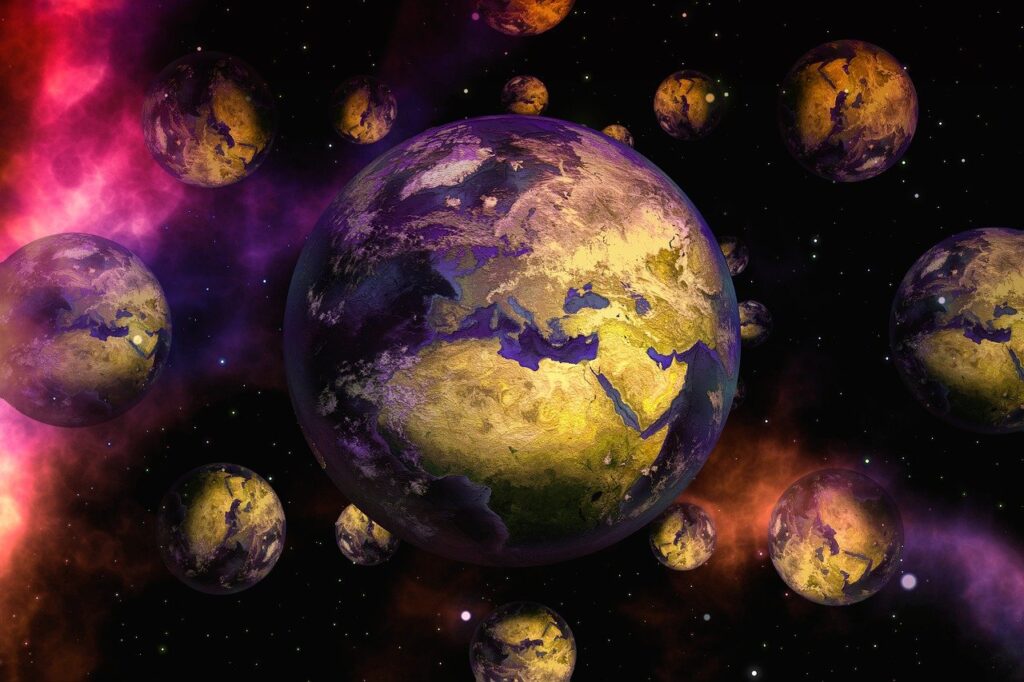
Many smart people are fascinated by philosophy, especially by the questions and answers that philosophy (and philosophers) can offer. One can literally spend their whole life searching for complex answers about life, death, the meaning of life, the nature of reality, and thousands of other topics.
Some philosophers ask fairly simple questions like “Do all people deserve respect?” while others tackle such complex matters that your head hurts if you try to understand anything.
And so, in this article, we will explore questions that are rather complex, deep, and in some way weird or strange.
One of the most intriguing philosophical concepts is the Ship of Theseus paradox. This paradox asks whether a ship that has had all of its parts replaced over time is still the same ship.
This question has perplexed philosophers for centuries and has led to many different answers. Some argue that the ship is still the same, while others believe that it is a completely different ship.
Interesting fact: The Ship of Theseus paradox has been used to question the identity of people as well. If all of a person's cells are replaced over time, are they still the same person?
Another strange philosophical concept is the Brain in a Vat hypothesis. This hypothesis suggests that it is possible that we are all just brains in vats being stimulated to believe that we are living in the real world.
This idea has been explored in science fiction and has led to many philosophical discussions about the nature of reality.
Okay, so now with that short introduction, let’s begin.
Here is the list (and brief explanation) of the top 10 deepest, strangest, or perhaps just rather interesting philosophical questions.
Can We Prove the Existence of Anything Outside Our Minds?

This is a good one, and not easily explainable.
On one hand, some philosophers argue that we can never truly know if anything exists outside our minds.
They point out that all of our perceptions are filtered through our senses, and we can never be certain if what we perceive is actually real or just a product of our minds. This argument is known as solipsism.
On the other hand, other philosophers argue that we can prove the existence of things outside our minds through logical reasoning and empirical evidence.
They point out that we can observe and measure the world around us, and this provides evidence that there is an objective reality outside our minds.
Despite the arguments on both sides, this question remains unanswered, and it is unlikely that we will ever be able to provide a definitive answer.
Interesting fact: The philosopher René Descartes excellently tackled this question in his Meditations on First Philosophy, where he famously declared, "I think, therefore I am."
What Is the Nature of Nothingness?

One of the most perplexing and fascinating philosophical questions is the nature of nothingness. What does it mean for something to be nothing? Is it even possible for there to be nothing at all? These are questions that have troubled philosophers for centuries.
One way to approach the question is to consider the different ways in which we use the term “nothing.”
For example, we might say that there is nothing in a particular room, meaning that the room is empty. But even an empty room is not truly empty, as it contains air molecules and other particles.
Another way to think about nothingness is to consider it in relation to somethingness. In other words, what is the relationship between something and nothing? Is nothing simply the absence of something, or is it something in its own right?
Philosophers have offered a variety of answers to these questions, ranging from the idea that nothingness is a kind of absence or lack, to the idea that it is a positive concept that can be studied and understood in its own right.
Most likely we will never have a definite answer to this puzzle.
Interesting fact: The concept of nothingness has been explored not only by philosophers, but also by scientists, mathematicians, and artists, among others.
Can Free Will Truly Exist in a Deterministic Universe?

Determinism is the philosophical belief that every event, including human actions, is caused by prior events and natural laws.
In other words, everything that happens is predetermined and inevitable. If determinism is true, then it seems that free will cannot exist, as our choices and actions are not truly our own.
However, some philosophers argue that free will can still exist in a deterministic universe. They suggest that while our actions may be predetermined, our conscious decision-making process is not.
This means that we still have the ability to make choices, even if prior events and natural laws ultimately determine those choices.
One way to think about this is to consider the difference between a robot and a human. A robot may be programmed to perform certain actions in response to certain stimuli, but it does not have the ability to make conscious choices.
In contrast, humans have the ability to make choices based on their own thoughts and desires, even if prior events and natural laws ultimately influence those thoughts and desires.
Interesting fact: The debate over free will and determinism is not just a philosophical one – it has also been studied by neuroscientists and psychologists who are trying to understand the nature of human decision-making.
Is There an Objective Reality?

Now this is an interesting one.
Some people argue that reality is entirely subjective and that what we perceive as “real” is simply a construct of our own minds.
Others argue that there is indeed an objective reality, independent of our own perceptions.
We’ve written extensively about this topic in our article – What Is True Nature of Reality?
One way to approach this question is to consider the role of perception in shaping our understanding of reality.
For example, the color of an object may appear differently depending on the lighting conditions or the angle from which it is viewed.
Does this mean that the object’s color is subjective, or that there is an objective reality that exists independently of our perception of it?
Another way to approach this question is to consider the nature of reality itself. Is reality something that exists independently of our own consciousness, or is it something that we create through our own perceptions and experiences?
If reality is entirely subjective, then it would seem that there is no objective reality at all.
This question will most likely be still debated for centuries to come. Except if we find out that the whole world is simulated.
Well, in that case, this question will transform into something completely different.
How Do We Define ‘Self’ Amid Constant Change?

Many humans are obsessed with themselves. Or with other humans. However, this question or philosophical concept delves into something completely different.
Namely, as humans, we are constantly changing, both physically and mentally. Our cells regenerate, our thoughts evolve, and our experiences shape us.
So, how can we define something that is constantly in flux?
One approach to defining the self is through the concept of consciousness. According to John Locke, the continuity of consciousness is what defines our identity.
This means that our memories and ability to reflect upon them are what make us who we are. However, this approach has been criticized for being too narrow, as it does not account for the physical changes that occur in our bodies.
Another approach is through the concept of the soul. Many religions and belief systems posit that we have an eternal soul that transcends physical changes and defines our true self.
However, this approach has also been criticized for lacking empirical evidence and being too subjective.
A third approach is through the concept of the ego. This approach postulates that our sense of self is created through our interactions with the world around us. Our experiences, relationships, and cultural context shape our ego and define our identity.
As you can imagine, this approach has also been criticized in some aspects. Most commonly for being too dependent on external factors and not accounting for the internal changes that occur within us.
At the end of the day as humans, we must embrace the mystery of the self and continue to explore it and reevaluate it every day.
What Is the Purpose of Life If Death Is Inevitable?

This is probably one of the most famous philosophical questions and will probably never be answered, especially because there could be thousands of different answers and no way to qualify the correct one.
Some argue that life has no meaning if death is inevitable, while others believe that the inevitability of death gives life meaning.
One perspective is that the purpose of life is to find happiness and fulfillment, regardless of the inevitability of death. This view suggests that the pursuit of happiness and personal growth is what gives life meaning and that the inevitability of death should not prevent individuals from living their lives to the fullest.
Another perspective is that the purpose of life is to leave a lasting impact on the world, whether through one’s work, family, or contributions to society. This view suggests that the inevitability of death is what makes life meaningful, as it inspires individuals to make the most of their time and leave a positive legacy.
Ultimately, the purpose of life is a deeply personal question that each individual must answer for themselves. Whether one believes that the purpose of life is to find happiness, leave a lasting impact, or something else entirely, the inevitability of death should not prevent individuals from living their lives to the fullest.
But again, however, you live your life that doesn’t mean you’ll find purpose in it.
And perhaps it should stay like that. What is even purpose at the end of the day? Or at the end of one’s life?
It’s mostly a construct invented by humans.
Interesting fact: The ancient Greek philosopher Epicurus believed that death should not be feared, as it is simply the end of consciousness and therefore cannot be experienced.
Does Language Shape Thought or Vice Versa?

Language is an essential part of human communication and thought. The question of whether language shapes thought or vice versa has been a topic of philosophical debate for centuries.
Some philosophers argue that language shapes thought, while others believe that thought shapes language.
One of the most influential theories on this topic is the Sapir-Whorf hypothesis. This hypothesis suggests that the structure of a language affects the way its speakers perceive the world.
For example, the Inuit language has many different words for snow, which allows its speakers to differentiate between different types of snow. This, in turn, may affect the way Inuit people perceive and think about snow.
However, the Sapir-Whorf hypothesis is not without its critics. Some say that language is just one of many factors that shape thought, and that other factors, such as culture and experience, are equally important.
Interesting fact: The Pirahã people, an indigenous tribe in the Amazon rainforest, have a language that lacks words for numbers and colors. This has led some to speculate that their perception of the world is fundamentally different from that of speakers of languages that have words for these concepts.
The Language of Thought
Another philosophical question related to language and thought is whether there is a “language of thought” that exists independently of any particular spoken or written language. This idea was first proposed by philosopher Jerry Fodor in the 1970s.
According to Fodor, the mind has a language-like structure that allows it to represent and manipulate information. This language of thought is not tied to any particular spoken or written language but is instead a universal mental “code” that all humans share.
The Limits of Language
Finally, some philosophers have argued that language is inherently limited in its ability to express certain kinds of thoughts and experiences. For example, the philosopher Ludwig Wittgenstein argued that there are some things that cannot be put into words and that the limits of language are the limits of our world.
This idea has been taken up by some contemporary thinkers, who argue that there are certain kinds of experiences, such as mystical experiences or experiences of the sublime, that cannot be fully captured in language.
Interesting fact: The philosopher Jacques Derrida famously argued that language is always "deferred," meaning that it never fully captures the meaning of what it is trying to express.
Can Machines Ever Attain Consciousness?

This is the type of question that we often explore here at CuriousMatrix.com
Some experts say that machines can indeed become conscious, while others believe that consciousness is a uniquely human trait that cannot be replicated in machines.
One theory that supports the idea of machine consciousness is Integrated Information Theory (IIT).
According to IIT, any mechanism with intrinsic power, whose state is laden with its past and pregnant with its future, is conscious.
The greater the system’s integrated information, the greater its consciousness. However, this theory remains controversial and is still being debated among philosophers and scientists.
Another argument against machine consciousness is the idea of the Chinese Room. This thought experiment, proposed by philosopher John Searle, asks the reader to imagine a person in a room who does not speak Chinese but has a set of rules that allow them to respond to Chinese questions in a way that makes it seem like they understand the language.
Searle argues that this person does not truly understand Chinese, just as a machine that responds to questions in a way that mimics consciousness does not actually possess consciousness.
Despite the ongoing debate, advancements in artificial intelligence continue to push the boundaries of what machines are capable of and it seems that it is just a matter of time when machines (AI) will attain full consciousness.
What Is the Value of Suffering?

Suffering is a common human experience that can take many forms, including physical pain, emotional distress, and mental anguish.
While many people view suffering as an inherently negative experience, some philosophers claim that it can have value and purpose.
One argument for the value of suffering is that it can lead to personal growth and development.
When individuals experience difficult or painful situations, they are often forced to confront their own limitations and weaknesses. This can lead to increased self-awareness and a greater sense of empathy for others who are also struggling.
Another argument for the value of suffering is that it can contribute to the development of virtues such as courage, resilience, and perseverance. When individuals are faced with challenging situations, they may be forced to develop these virtues in order to overcome the obstacles in their path.
However, everyone knows that not all suffering is valuable or meaningful. Many types of suffering come as pure unjust, unluck, or something similar.
In these cases, it is not easy to reasonably explain the value of that specific suffering.
Could Multiple Universes Exist Without Intersecting?

The idea of multiple universes existing simultaneously is not new in philosophy. However, the concept of parallel universes, also known as the multiverse theory, has gained popularity in recent years.
According to this theory, there could be an infinite number of universes, each with its own set of physical laws and constants that govern it.
One of the most intriguing aspects of the multiverse theory is the idea that these universes may exist without ever intersecting or interacting with each other. This means that each universe would be completely isolated, with no way of communicating or exchanging information with any other universe.
While the idea of multiple, isolated universes may seem unbelievable, it is not entirely impossible.
Some physicists and cosmologists suggest that the multiverse theory could help explain certain phenomena, such as the fine-tuning of physical constants that make life possible in our universe.
And so there you have it – the top 10 deep, big, weird, strange, or just interesting philosophical questions.
While many remain unanswered, and probably many will until the end of time, it is in human nature to ask questions. It is in our consciousness to explore, to wonder, and to think about the world, the universe, and deep and complex subjects.
That makes us who we are.
That makes us human.




























